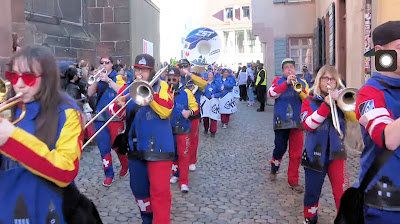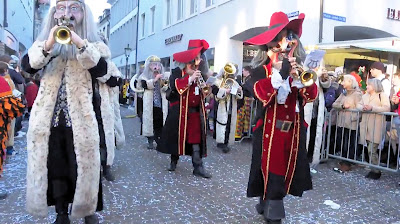Well, do they dominate the Fatherland?
Eighty percent of people in Germany speak only German as their mother tongue in their own homes. This was announced by the Federal Statistical Office last Tuesday on the occasion of International Mother Language Day. Another 15 percent are so-called multilingual and use at least one other language at home.
Instead, Red Baron previously blogged about the Tag der deutschen Sprache (German Language Day).
In our mother language, we think and feel, generating a people's national identity.
Take Poland, divided among neighboring states and twice eradicated from the European map. For them, their mother tongue remained the binding force and hope “Jeszcze Polska nie zginęa (Poland Is Not Yet Lost).”
Take Germany, divided into many small states and under Napoleon's rule. In this deepest humiliation, as German poets termed it, they saw in our everyday language a sign of hope as Turnvater (father of gymnastics) Johann Friedrich Ludwig Jahn powerfully formulated, “Germans, feel again with manly high-mindedness the value of your noble, living language, draw from its never-ending Urborn (initial spring), dig up the old springs and leave Lutetien's (Lutetia, Latin for Paris) standing pool in peace!”
Where the language is spoiled, consciousness and culture suffer, like in the aftermath of the Thirty Years’ War. Günter Grass wrote about the “anger about the mucking-up of the German language. Hoof prints and wheel tracks of French and Swedish military campaigns had carved the tongue's sensitive ground.”
The Fruchtbringende Gesellschaft (Fruitbringing Society), with the emblem of a palm tree founded in 1617, tried to guide the German language back into its “innate purity, adornment, and acceptance.” “Only the poets still knew what was worth calling German. With many hot sighs and tears, they had tied the German language as the last bond,” concluded Grass.
Therefore, the active cultivation of language and the learning of the mother tongue should be the first concern of schools.
Eighty percent of people in Germany speak only German as their mother tongue in their own homes. This was announced by the Federal Statistical Office last Tuesday on the occasion of International Mother Language Day. Another 15 percent are so-called multilingual and use at least one other language at home.
Instead, Red Baron previously blogged about the Tag der deutschen Sprache (German Language Day).
In our mother language, we think and feel, generating a people's national identity.
Take Poland, divided among neighboring states and twice eradicated from the European map. For them, their mother tongue remained the binding force and hope “Jeszcze Polska nie zginęa (Poland Is Not Yet Lost).”
Take Germany, divided into many small states and under Napoleon's rule. In this deepest humiliation, as German poets termed it, they saw in our everyday language a sign of hope as Turnvater (father of gymnastics) Johann Friedrich Ludwig Jahn powerfully formulated, “Germans, feel again with manly high-mindedness the value of your noble, living language, draw from its never-ending Urborn (initial spring), dig up the old springs and leave Lutetien's (Lutetia, Latin for Paris) standing pool in peace!”
Where the language is spoiled, consciousness and culture suffer, like in the aftermath of the Thirty Years’ War. Günter Grass wrote about the “anger about the mucking-up of the German language. Hoof prints and wheel tracks of French and Swedish military campaigns had carved the tongue's sensitive ground.”
The Fruchtbringende Gesellschaft (Fruitbringing Society), with the emblem of a palm tree founded in 1617, tried to guide the German language back into its “innate purity, adornment, and acceptance.” “Only the poets still knew what was worth calling German. With many hot sighs and tears, they had tied the German language as the last bond,” concluded Grass.
Therefore, the active cultivation of language and the learning of the mother tongue should be the first concern of schools.

|
| ©Euronews |
There are significant variations among regions. Nordic countries excel at bilingualism, while Southern Europe struggles a bit more. Perhaps unsurprisingly, countries where English is the native language, don't appear interested in learning a foreign language, with only 50 percent of Irish people speaking another language. The worst European score is attributed to the UK, at a slim 34 percent.
Countries with several official languages, like Switzerland, Luxembourg, and
Belgium, are generally better off, so I am astonished that Germans are on
equal terms with the Belgians.
How to learn a second language well? Live in a country long enough and mix with the native people. For instance, two German parents raised their children in the Swiss Romande. They would only speak German at home and would let their kids become fluent in French by being exposed to the language everywhere outside their house, including schooling. So my children’s mother tongue is French.
They communicate well in German since they were exposed to the colloquial German spoken at home, but they were missing lots of vocabulary and sophisticated constructions of phrases. This deficiency they quickly straightened out in their professional life.
*
How to learn a second language well? Live in a country long enough and mix with the native people. For instance, two German parents raised their children in the Swiss Romande. They would only speak German at home and would let their kids become fluent in French by being exposed to the language everywhere outside their house, including schooling. So my children’s mother tongue is French.
They communicate well in German since they were exposed to the colloquial German spoken at home, but they were missing lots of vocabulary and sophisticated constructions of phrases. This deficiency they quickly straightened out in their professional life.
*
















































